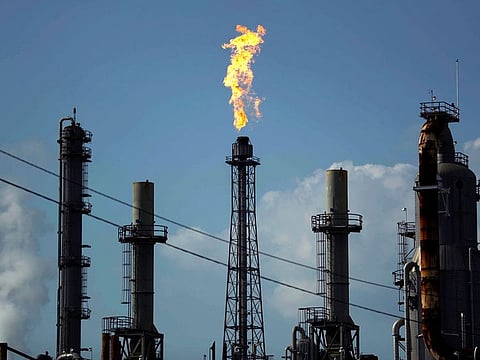Oil gets shock treatment, now it needs a cure
Futures dropping below $0 a barrel is signal to OPEC+ to work on alternate strategies

The way panic spread through global oil markets early last week was pretty much similar to that caused by the initial outbreak of the coronavirus, although the nature, of course, differed widely.
It was for the first time in modern history that a strategic commodity was sold at three times lower than its retail price. The seller pays buyers to agree to take the commodity for free while getting a large profit margin of minus $40!
The unprecedented decline ran contrary to many economic theories that govern the sector and the laws of commodity exchanges since the days of Adam Smith and David Ricardo, who amassed vast fortunes from trading on the stock exchange.
Did any of these great economists and investors ever think such a scenario would happen? The worst case that could have been imagined was when an economic depression takes places and brings down price prospects of a commodity. At which time, anyone holding the commodity will have to dispose of these at the market price and taking heavy losses.
It is plausible to say that the huge transformation that took place last week was largely because of financial and trading processes introduced to international commodity exchanges, such as short-selling, futures and derivatives trading. Plus, other techniques that some investors mastered by virtue of their hegemony over certain sectors.
Yet, small retail investors with nonexistent understanding about this complicated market and its infinite capacity to trigger shocks have been dealt a bad hand. It is clear that the abnormal situation in the oil markets resulted from the combination of coronavirus and the “corona of oil”, which affected all markets.
Although global demand for oil has been plummeting by more than 30 per cent, production was increasing that led to speedy filling up of oil storage reservoirs and turning oil temporarily into a “pariah” commodity.
Everyone is trying to get rid of it at any price, which put the most important energy source in the world in an awkward position.
Pinning responsibility
A question arises: Who is responsible for this shift in selling a barrel oil at a negative price? The Western media are trying to throw the blame on the producing countries, especially Arab Gulf states,. But that is an analysis divorced from the reality.
These countries have nothing to do with what happened on Monday (April 21), but, rather, the responsibility for this rests with the financial capitalism that allows investors and speculators to deal with “paper barrels” through futures contracts to achieve quick and easy profits.
What matters now are the consequences of this historic development, which will last for months. The large storage terminals will affect supply and demand even if production is significantly reduced as part of the OPEC+ agreement.
Although things might not change without countries from outside this group joining in the deal, efforts to boost prices to levels producing countries aspire for will still be hindered.
Go back to the drawing board
OPEC+ countries need to review their strategies because the current deal, even with other strategic producers being part of it, will not help much for the recovery of prices. Especially as the main consumption sectors, such as transportation and factories, will only resume work gradually.
The available options, unfortunately, are limited, but they can try to withdraw part of the strategic stock of major countries by making more temporary reductions.
Create some balance
Doing so may restore some balance in the markets, and this is what is happening now with the mandatory reduction of production by many countries due to weak demand and the fullness of strategic reservoirs.
This would also take off a strong card from consuming countries’ table, which will try to take advantage of this situation as far as possible.
This means the tensions between oil exporting and consuming countries will continue to intensify, causing starker fluctuations and creating further economic difficulties to oil producers.
This is why these countries need more than ever to review many of their financial policies to avoid catastrophic financial and economic predicaments.
And to be ready to absorb shocks, which would eventually help them overcome the ongoing crisis.
- Mohammed Al Asoomi is a speciality in energy and Gulf economic affairs.







